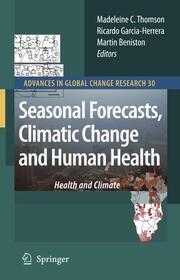Detailansicht
Seasonal Forecasts, Climatic Change and Human Health
Health and Climate, Advances in Global Change Research 30
ISBN/EAN: 9781402068768
Umbreit-Nr.: 1201232
Sprache:
Englisch
Umfang: x, 232 S.
Format in cm:
Einband:
gebundenes Buch
Erschienen am 31.03.2008
Auflage: 1/2008
- Zusatztext
- InhaltsangabeFrom the Table of Contents Acknowledgements List of Contributors Section 1.-1 Seasonal climate forecasting for health.- 2 The impact on human health of climate and climate change: Research in the ENSEMBLES Project from seasonal to centennial timescales.- 3 Flowering Walnuts in the Wood' and Other Bases for Seasonal Climate Forecasting.- 4 Climate and infectious diseases.- 5 Integration of seasonal forecasts into early warning systems for climate sensitive diseases such as malaria and dengue.-6 Climate and environmental information and the control of epidemic meningitis in Africa.- 7 A Multimodel Framework in Spport of Malaria Suveillance and Control.- 8 Recent Developments and Next Steps in Seasonal Forecasting and Health.- Section 2.- 9 Climate change and health.- 10 The RedGems* Information System: Climate, Environment and Public Health.- 11 Impacts of Heat and ozone on Mortality Risk in the New York City Metropolitain Region under a Changing Climate.- 12 Physiological Equivalent Temperature as Indicator For Impacts of Climate Change on Thermal Comfort of Humans.- 13 Weather, Ambient Air Pollution and Bronchial Asthma In Athens, Greece.- 14 Outreach from the IAI Collaborative Research Network On Climate Variability and Human Health Impacts in the Tropical Americas.- 15 Recent Developments and Next Steps in Climate Change and Health.- Index.- Appendix 1 Colour plates.
- Kurztext
- Awareness that many key aspects of public health are strongly influenced by climate is growing dramatically, driven by new research and experience and fears of climate change and the research needed to underpin policy developments in area is growing rapidly. This awareness has yet to translate into a practical use of climate knowledge by health policy-makers. Evidence based policy and practice is the mantra of the health sector. If climate scientists are to contribute effectively to health policy at local and global scales then careful empirical studies must be undertaken - focused on the needs of the public health policy and decision-makers. Results presented at the Wengen conference make clear that the science and art of integrating climate knowledge into the control of climate sensitive diseases on a year to year time frame as well as careful assessments of the potential impacts of climate change on health outcomes over longer time frames is advancing rapidly on many fronts. This includes advances in the empirical understanding of mechanisms, methodologies for modeling future impacts, new partnership developments between the health and climate community along with access to relevant data resources, and education and training. In a rapidly evolving field this book provides a snapshot of these emerging themes.
